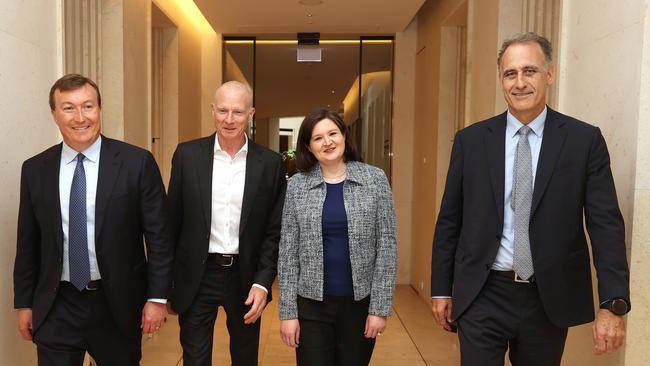Long-term vision needed ‘to secure economy’: business
Business leaders have called on both sides of politics to set out a long-term vision in order to get the foundations in place to lift living standards.

Senior business leaders have called on both sides of politics to set out a long-term vision for Australia in order to get the foundations in place to lift living standards for all.
There needs to be the ambition to break away from the short-term, election-cycle thinking that ultimately undermines any chance for reform, they say.
“Long-term vision should be the great thing for government in Australia,” Wesfarmers chief executive Rob Scott told a forum hosted by The Australian and the Business Council of Australia examining productivity and competition in the economy.
Mr Scott, whose conglomerate oversees retailers from Bunnings to Kmart and is developing a lithium business, said it was not a matter of “picking winners” or being highly prescriptive. Rather, it should lay out a clear ambition for the economy for the next two decades, which means everyone can start pulling together.
“What we should do is commit ourselves to being the most attractive environment for capital, developing the best and most talented skills and talent in the world, and where the best talent in the world want to work,” Mr Scott said.
“Let’s get the settings right, and then just let amazing people get on and businesses identify those opportunities.”
BP Australia president Lucy Nation said Australia needed to get into a position where governments “are really fighting for investment”. “We are in a much more global race than we ever have been for investment, and unless we do more in a co-ordinated and really proactive way our standards of living will fall because we won’t be able to keep pace with those really long-term and big investments that are needed to maintain the productivity growth that we need.”
BCA chief executive Bran Black said coming out of Covid and the inflation shock that followed, the moment was right to develop a vision for the nation’s economic future.
He noted one of the take-outs from last month’s Queensland election that saw David Crisafulli’s Liberal National Party sweep to power was voters had rejected short-term cost-of-living initiatives like electricity subsidies outlined by his predecessor as premier, Labor’s Steven Miles, during the campaign.
“People understand that the position that we’re in now is not a function of the need for those immediate, short-term sugar hits, but rather it’s a feature of the trajectory that we’ve been on for a long period of time,” Mr Black said.
“We need to look to genuine plans and leadership, to reverse that trajectory and start putting us on a different track altogether.”
Mr Black said there was a similar mood coming out of the economic shocks of the 1970s and early 1980s that led to both sides of politics pursuing ambitious, but necessary, reforms.
Dig Howitt, who heads up the $20bn hi-tech bionic ear implant maker Cochlear, said medical research was a good place to start with a longer term strategy.
He said the research-and-development tax incentive was a “very good system” in that it encouraged in-depth medical research. But it is R&D focused, and the opportunity is being missed to scale up to production, which is increasingly moving offshore.
“We do fantastic medical research in Australia, a lot of the funding goes into that front end. And there’s just not the follow on once you’re in manufacturing,” Mr Howitt said.






To join the conversation, please log in. Don't have an account? Register
Join the conversation, you are commenting as Logout